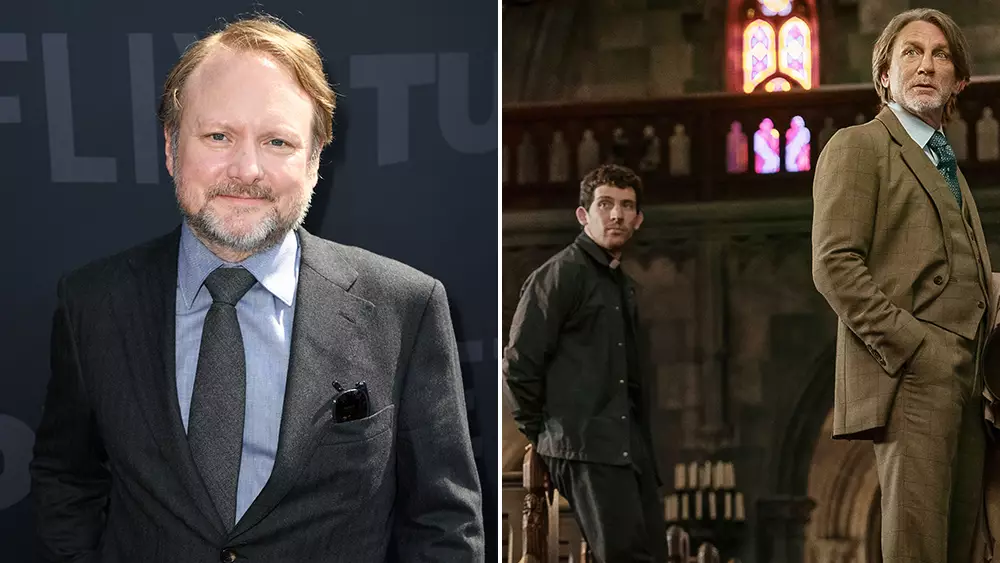Rian Johnson’s upcoming installment in the *Knives Out* universe, titled *Wake Up Dead Man: A Knives Out Mystery*, signals a deliberate departure from the playful, camp-infused tone of *Glass Onion*. Instead, Johnson is choosing to dive deeper into the genre’s darker, more atmospheric origins, channeling a Gothic sensibility reminiscent of Edgar Allan Poe. This shift isn’t just a stylistic choice but an ambitious attempt to re-engage audiences with the roots of mystery storytelling—where mood, atmosphere, and psychological depth take precedence over surface-level intrigue.
Johnson’s move is a testament to his artistic integrity and desire for evolution. Faced with the challenge of keeping a long-running series fresh, he refuses to stagnate by repeating the same tonal formulas. Instead, he seeks complexity and nuance, aiming for a film that feels both fresh and rooted in a tradition that predates even the beloved works of Agatha Christie. This renewed focus on darkness and gravitas could potentially elevate the franchise, offering a richer, more textured narrative experience that appeals to viewers craving substance over spectacle.
The Art of Reinvention in Modern Mystery Cinema
What makes Johnson’s decision noteworthy is his candid admission of the importance of experimentation. He openly describes the risk-taking inherent in each project. After three years immersed in *Glass Onion*, the need for variety becomes palpable. His creative instinct pushes him to explore different tonal territories—to avoid the trap of predictability. This flexibility is crucial in a genre often criticized for formulaic storytelling.
The Gothic tone, with its emphasis on atmosphere, psychological tension, and morally complex characters, promises a more immersive experience. It signals Johnson’s intent to tap into the tradition of horror and noir, genres that thrive on ambiguity, dread, and the exploration of darker human impulses. By grounding the plot in a more visceral, Gothic framework, the film hints at a narrative that’s less about whodunnit surprises and more about the unraveling of inner truths and secrets, adding layers of depth that could set a new standard for mystery films.
Furthermore, Johnson’s approach highlights an essential truth about the creative process: reinvention fuels growth. His avoidance of complacency is not only admirable but necessary in a landscape where audiences increasingly crave innovative storytelling. Adapting the tone based on context and personal artistic evolution ensures that each installment remains a genuine reflection of his inventive spirit, rather than just a franchise with a predictable formula.
Future of the Series: Open-Ended and Dynamic
While Johnson is keen to continue exploring this universe, he emphasizes that he’s not locked into a specific blueprint. His openness to future films underscores a commitment to artistic freedom and innovation. Each installment is a fresh challenge—an opportunity to “take a swing” and see where the story and tone can go next.
This flexibility is vital in keeping the series alive and relevant. It prevents burnout and allows for a diverse array of storytelling styles within the same overarching universe. Johnson’s willingness to experiment—trying different genres, tones, and narrative structures—demonstrates a forward-thinking approach that could set a new standard for franchise filmmaking. It’s a reminder that blockbuster series do not need to be mired in sameness; instead, they can evolve, explore, and surprise.
The cast list, featuring heavyweights like Glenn Close, Josh Brolin, Mila Kunis, and others, indicates not only high production values but also a desire to infuse each film with gravity and sophistication. Their involvement in a Gothic mystery promises a layered and intense exploration of character, morality, and human flaw.
The Significance of a Gothic Return
Ultimately, Johnson’s choice to revisit the Gothic genre is an audacious reminder of the rich tapestry of storytelling traditions that shape the mystery genre—traditions that often get overshadowed by modern spectacle. By grounding *Wake Up Dead Man* in Gothic themes, Johnson combines classical atmospheric horror with contemporary intrigue, offering a fresh lens through which to view familiar characters and narratives.
This return to genre origins may also serve a broader cultural purpose. In times of uncertainty and unrest, stories rooted in Gothic themes—mystery, darkness, human vulnerability—resonate on a primal level. They tap into our collective subconscious and evoke profound emotional responses, enriching the audience’s engagement far beyond mere entertainment. Johnson’s adaptability, combined with a reverence for genre history, hints at a film that could challenge conventions, provoke thought, and elevate the mystery genre to new heights of artistry.
